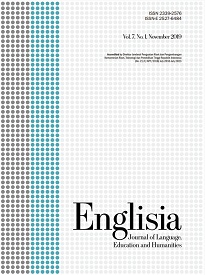EXPLORING ENGLISH TEACHERS' BELIEFS ON THEIR TEACHING PROFESSION
DOI:
https://doi.org/10.22373/ej.v7i1.3012Keywords:
Influence, teachers, teachers’ beliefs, and teaching professionAbstract
The aim of this study is to explain the influence of the English teachers’ beliefs toward their teaching profession in Bireuen District, Aceh Province. This is a quantitative study which involved thirty English teachers as the respondents. These teachers teach at six high schools in Bireuen. The schools were purposively selected to cover the broad area of Bireuen District. Some of the schools were in the rural area, some are in the city. Five English teachers from each high school were randomly selected. The data collection was done using questionnaires. It can be concluded from the answer that in general the teachers have positive beliefs toward their profession, they satisfied with their job, they feel confidence about their job, it can also be seen from the answers that most teachers received appraisal and feedback from other teachers and most of the teachers believe that appraisal and feedback can increase teaching passion. Beliefs about overall job-related principles, job satisfaction, self-efficacy and appraisal and feedback give big influence toward their teaching profession as English teachers. This big influence is affecting teachers is various way. Beliefs appear to have the strongest impact on teacher learning, followed by changes in teacher behavior and last on students learning.Downloads
References
Ayele, D. (2014). Teachers’ job satisfaction and commitment in general secondary schools of hadiya zone, in southern nation nationality and people of regional state. (Unpublished master’s thesis). Jimma University, Jimma, Ethiopia.
Brown, H. D., & Rodgers, T. S. (2002). Doing second language research. Oxford, United Kingdom: Oxford University Press.
Butt, G. (2005). Teacher job satisfaction: Lessons from the TSW pathfinder project. School Leadership and Management, 25, 455-471.
Cobbold, C. (2015). Professionals without a profession? The paradox of contradiction about teaching as a profession in Ghana. Journal of Education and Practice, 6(6), 125-135.
Creswell, J. W. (2007). Qualitative inquiry and research design: choosing among five approaches. Thousand Oaks, CA: Sage Publication, Inc.
Depdiknas. (2007). Peraturan Menteri Pendidikan Nasional UU No 14 tahun 2005 no. 16 Tahun 2007. Jakarta: Depdiknas.
Educating Indonesia. (2013, February 22). Al Jazeera. Retrieved from https://www.aljazeera.com/programmes/101east/2013/02/201321965257154992.html
Elliott, K. (2015). Teacher performance appraisal: More about performance or development? Australian Journal of Teacher Education, 40(9). http://dx.doi.org/10.14221/ajte.2015v40n9.6
Esmaelian, M., Rahmani, T., & Pordanjani, H. M. (2014). Comparison of characteristics of teachers in primary schools, with idealism teachers features. Technical Journal of Engineering and Applied Science, 4(4), 388-393.
Gavora, P. (2010). Slovak pre-service teacher self-efficacy: Theoretical and research considerations. The New Educational Review, 21(2), 17-30.
Golombek, P. R. (1998). A study of language teacher’ personal practical knowledge. TESOL Quarterly, 32(3), 447-464.
Hafil, M. (2015, December 31). Guru Yogjakarta Raih Nilai UKG Tertinggi. Republika.co.id. Retrieved from http://www.republika.co.id/berita/koran/didaktika/15/12/31/o07q886-guru-yogyakarta raih-nilai-ukgtertinggi?fb_comment_id=913195098777225_933181843445217#f87ec083
Hargreaves, L., Cunningham, M., Everton, T., Hansen, A., Hopper, B., McIntyre, D., Maddock, J., Pell, T., Turner, P., Mukherjee, J., & Wilson, L. (2006). The status of teachers and the teaching profession: Views from inside and outside the profession (Research Report RR755). Cambridge, United Kingdom: Department of Education and Skill, University of Cambridge.
Jackson, P. W. (2012). What is education? Chicago, IL: University of Chicago Press.
Kagan, D. M. (1992). Implications of research on teacher belief. Educational Psychologist, 27, 65-90.
Marshall, C., & Rossman, G. B. (2006). Designing qualitative research. Thousand Oaks, CA: Sage Publication.
Mart, C. T. (2013). A passionate teacher: teacher commitment and dedication to student learning. International Journal of Academic Research in Progressive Education and Development, 2(1), 437-442.
Musriadi. (2016). Profesi Kependidikan. Jogjakarta, Indonesia: Deepublish.
Ngimbudzi, F. W. (2009). Job satisfaction among secondary school teachers in Tanzania. (Unpublished master’s thesis). University of Jyvaskyla, Yliopisto, Finland.
Nye, B., Konstantanopoulos, S., & Hedges, L.V. (2004). How large are teacher effects? Educational Evaluation and Policy Analysis, 26(3), 237–257.
OECD. (2009). Creating Effective Teaching and Learning Environments: First Results from TALIS, Paris, France: OECD Publishing.
OECD. (2013). Creating Effective Teaching and Learning Environments: First Results from TALIS. Canada: Organization of Economic Collaboration and Development.
Puchner, L. D., & Taylor, A. R. (2006). Lesson study, collaboration and teacher efficacy: Stories from two-school based math lesson study groups. Teaching and Teacher Education, 22, 922-934.
Richards, J. C., & Lockhart, C. (2005). Reflective Teaching in Second Language Classrooms. New York, NY: Cambridge University Press.
Sudjana, N. (1992). Metode Statistika, Bandung, Indonesia: Tarsito.
Susanto, M. (2004). Menimbang Ruang Menata Rupa. Jogjakarta, Indonesia: Galangpress Group.
Yoshihara, R. (2012). ESL Teachers’ teaching beliefs and practices: A case study of three teachers in an ESL program in Hawaii. Integrated Cultural Studies, 18(1), 41-61.
Downloads
Published
Issue
Section
License
Proposed Policy for Journals That Offer Open Access
Authors who publish with Englisia journal agree to the following terms:
- Authors retain copyright and grant the journal right of first publication with the work simultaneously licensed under a Creative Commons Attribution License that allows others to share the work with an acknowledgement of the work's authorship and initial publication in this journal.
- Authors are able to enter into separate, additional contractual arrangements for the non-exclusive distribution of the journal's published version of the work (e.g., post it to an institutional repository or publish it in a book), with an acknowledgement of its initial publication in this journal.
- Authors are permitted and encouraged to post their work online (e.g., in institutional repositories or on their website) prior to and during the submission process, as it can lead to productive exchanges, as well as earlier and greater citation of published work (See The Effect of Open Access).









